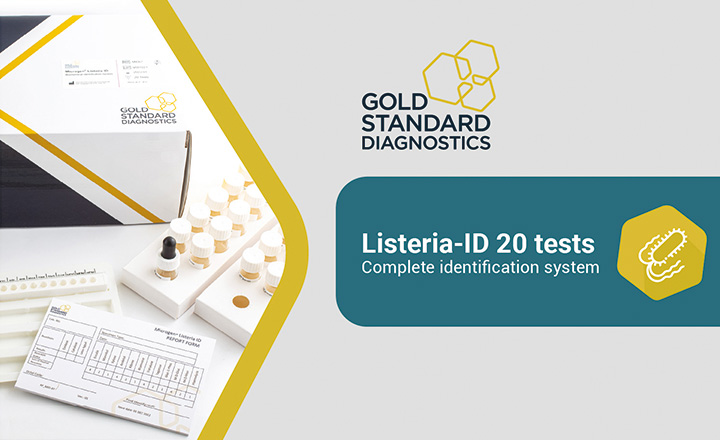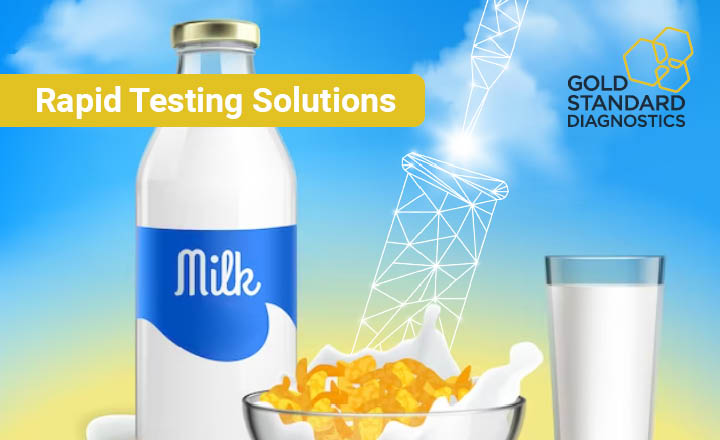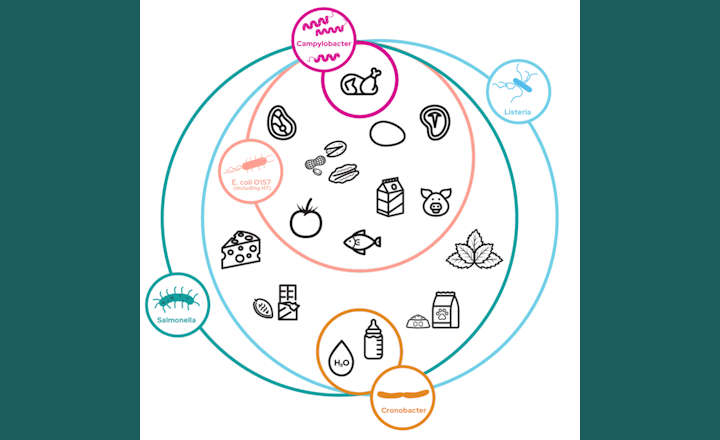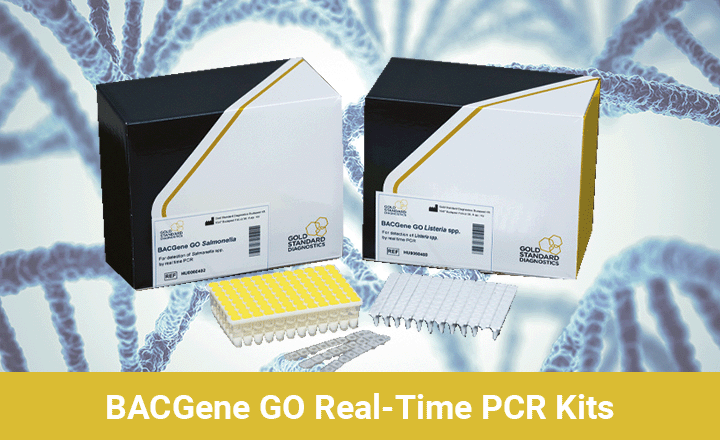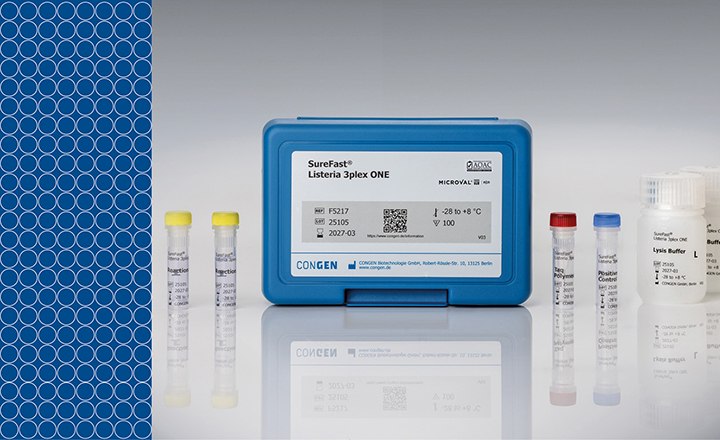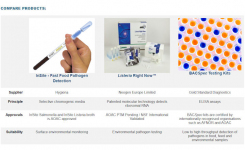
Initially thought to be linked to frozen corn products only, frozen vegetables have also been implicated as likely the source of an outbreak of Listeria monocytogenes that has affected various EU countries including Austria, Denmark, Finland, Sweden and the United Kingdom since 2015. A total of 47 people have been sickened with 9 deaths across the EU.
Several food products have been implicated with a total of 43 Greenyard food product recalls in major UK supermarkets. After investigations including whole genome sequencing on a variety of food products. L. monocytogenes IVb sequence type (ST) 6 was isolated and the outbreak linked to a processing plant in Hungary. The strains were detected in Greenyard frozen vegetables since 2016 suggesting the bacteria persisted in the processing plant environment despite cleaning and disinfection.
rapidmicrobiology.com spoke to Dr Kathie Grant, international expert in foodborne pathogens who leads the UK’s national reference laboratory for Listeria monocytogenes about how whole genome sequencing helped to identify the source of contamination.
How does frozen veg become contaminated with Listeria? Listeria monocytogenes is widely distributed in the natural environment being found in water, soil, vegetation, silage, sewage, drains, farm and marine environments; it is also found in the intestinal tract of many animals including mammals, birds, fish, insects, reptiles. As such it easily gets into the food chain as a contaminant of raw food.
Whilst it is killed by heat processes such as pasteurisation it is innately resistant to harsh environmental conditions e.g. it survives low pH, high salt, low a<sub>w</sub> and can grow at refrigeration conditions as well as producing biofilms. This can result in it persisting in food processing environments with the potential to contaminate foods. Foods that receive no further cooking or heat treatments such as ready-to-eat foods are an issue.
Were there any issues with this manufacturer's own Listeria monitoring approach? To my knowledge there were no issues identified with the monitoring for Listeria that was being carried out in the UK though I’m not aware of all the details of the manufacture’s monitoring approaches as the company has several production sites in different countries. In the UK the implicated frozen vegetables all had cooking instructions on them which would have been sufficient to destroy any Listeria present but there is evidence indicating that frozen vegetables are used uncooked e.g. are thawed and used directly in salads etc
How has whole genome sequencing helped to identify the source here? Whole genome sequencing has been crucial for identifying the outbreak in the first instance (i.e. it showed that the Listeria isolates from clinical cases were all the same, thus enabling linking of the clinical cases); in demonstrating it was a multi-country outbreak (i.e. clinical isolates from different countries had the same genome sequence) and for providing the evidence that the strain of Listeria from the frozen vegetables matched the Listeria isolates from the clinical isolates (i.e. identified and confirmed the source).
It also demonstrated that cases were infected with the same strain over a prolonged period; i.e. from at least the end of 2015 – 2018 and thus the contaminated product had been on the market for a considerable time. Prior to using whole genome sequencing this was not possible, sequencing results have helped drive these food tracing studies.
Have the tracing and recall systems in place worked in this particular outbreak? The food tracing was carried out by the Food Standards Agency in the UK working with the European Food Safety Authority and colleagues in other European countries. There was a very complex food distribution network and it took time to get all the information to understand exactly how the distribution network worked.
The product recalls appear to have been successful and there have been no new cases identified since end of May 2018 although due to the long shelf life of frozen vegetables it is still possible that new cases could occur.
Are there any lessons to be learnt for other food manufacturers who want to avoid a recall? The process of freezing vegetables involves a blanching step which should be sufficient to destroy any Listeria present on the vegetables, the procedures in place to verify the effectiveness of this step are being investigated – this highlights a requirement for the control of critical steps in food processing procedures.
When Listeria is detected as part of monitoring, even if it is low levels below the legal limit, the source contamination should be investigated as L. monocytogenes can persist in food processing environments for several years. Factory hygiene in general is important, particularly cleaning of equipment - equipment should be able to be dismantled for thorough cleaning.
There are lessons that are being taken forward such as reviewing the labelling of frozen vegetables regarding the requirement for cooking and the provision of clear cooking instructions.
There are also recommendations jointly from EFSA and ECDC for thorough microbiological sampling and testing at critical sites along production lines - EFSA (European Food Safety Authority), Allende A, Barre L, Jacxsens L, Liebana E, Messens W, Sarno E and da Silva Felicio MT, 2018. Urgent scientific and technical assistance to provide recommendations for sampling and testing in the processing plants of frozen vegetables aiming at detecting L. monocytogenes.
Any takeaways from this incidence? This is the first time with the use of whole genome sequencing that an ongoing multi-country outbreak of listeriosis has been identified. The collaborative working of affected countries detected a multinational outbreak and enabled frozen vegetables to be identified as a potential source. Sampling of products resulted in isolation of Listeria and whole genome sequencing unequivocally demonstrated that isolates from patients and the food were the same strain.
About Dr. Kathie Grant: Dr Kathie Grant is a champion of molecular methods and Head of Public Health England’s (PHE) Gastrointestinal Bacteria Reference Unit in the United Kingdom. Her laboratory the first reference laboratory worldwide to routinely use whole genome sequencing routinely for national surveillance and outbreak investigations of L. monocytogenes, Salmonella, Campylobacter and E. coli STEC.
An Overview of L. monocytogenes Outbreaks Associated with Vegetables Listeriosis became a notifiable disease for the CDC in 2011 and causes an estimated 1,600 cases of illness in the US annually. More commonly associated with dairy and chilled foods such as soft cheeses, unpasteurised milk products and cold cut meats, vegetables have also been the source of a number of outbreaks in the last decade.
In 2010 ten cases of hospital-acquired listeriosis associated with machine cut diced celery served in a hospital facility in Texas led to death by attribution in three patients. PCR testing detected L. monocytogenes in isolated samples via culturing. Following the recall of products, the outbreak ended.
In 2016, 14 voluntary product recalls were announced in response to a listeriosis outbreak that had caused eight cases of illness across three states in the US. Initially 11 products were recalled in April then this was further expanded to include all frozen vegetable and fruit products processed at a facility in Washington since 2014, a total of 358 products sold under 42 different brands. By the end of the CDCs investigation, nine hospitalisations and three deaths had occurred.
More recently, earlier this year in May frozen broccoli contaminated with L. monocytogenes was detected at Stop and Shop’s store, South Windsor, Connecticut. Though there have been no reports of illness, the product was voluntarily recalled as a safety measure following a product sample testing positive for L. monocytogenes by the state of Connecticut Department of Consumer Protection.
The current EU-wide listeriosis outbreak is ongoing, it is important to note that new cases may be identified at any time due to the lengthy incubation period of L. monocytogenes as well as future consumption of long shelf life frozen products, which may have been bought before a recall was issued. Additionally, the overall extent of the outbreak may very well be underestimated as only a subset of EU/EAA countries adopt the routine use of advance techniques in characterising L. monocytogenes isolates.
A Polish company plant was initially considered as a point of contamination, but later excluded after environmental testing proved the L. monocytogenes strain related to the outbreak was not detected on site. Freezing activities at the implicated Hungarian processing site have ceased since June and the financial implications for Greenyard, which had a turnover of €24 million between 2017-18 is yet to be determined.
Further reading: Whole Genome Sequencing: the state of play, European Food Safety Authority, 29th June 2018 Joint Rapid Outbreak Assessment, European Centre for Disease Control 3rd July 2018


